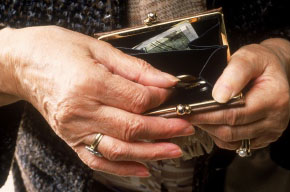Economic downturn affecting wellbeing of older people, BU research finds
Posted on Thursday, May 2 2013

The economic downturn is having a marked impact on the wellbeing of ‘asset rich, cash poor’ older people, Bournemouth University researchers have found.
The study looked at the financial challenges facing retired older people, who are often considered to be asset rich but cash poor – owning property but not receiving a large monthly income.
As well as the economic downturn affecting their social, mental and physical wellbeing, researchers found that the income many older people expected when planning for retirement had not come to fruition, and they felt poor in relation to their previous lifestyle and expectations.
Lead researcher Dr Sarah Hean, Associate Professor in Health, Wellbeing and Ageing at BU, said: “It’s really frightening. They have done everything right – saved, got pensions, taken out policies and ISAs and put money into property.
“But the return on investments at the moment is nothing – there is no interest on savings, and they can’t sell their houses. They are just in a terrible place.”
Academics from BU’s School of Health and Social Care and Business School studied the experiences of retired home-owners from across Dorset, who were over the age of 65 and were not in receipt of a means-tested state pension.
They also conducted focus groups with service providers for older people – including health and social care professionals, financial advisors and professionals from the not-for-profit sector.
The research found that older people tended to manage their money carefully, and had an aversion to debt.
But this meant they were sacrificing non-essential activities like holidays, hobbies, and socialising, and worried about unexpected and potentially costly events, like large heating bills and repairs to their homes.
Many interviewees spoke of worry and stress about their financial situation, and the fear of debt and future ability to cope financially.
The study also found that, in order to make ends meet, older people may take greater financial risks or be more vulnerable to abuse.
“There was concern about how vulnerable older people are to exploitation, and they talked a lot about how the economic downturn was stopping people going out, exacerbating their isolation,” said Dr Hean.
“The austerity cuts could have a real impact on services relied on by older people for their social and physical wellbeing – there was one woman who kept going to the library because it was warm and it saved her on heating bills.”
The researchers conducted interviews with 28 older people from both rural areas and urban conurbations within Dorset, and held focus groups with 20 service providers.
They found that older people preferred to go to friends, charities and the media for financial advice, rather than professionals – suggesting a need for more appropriate financial information and support for older people.
“Trust is huge for older people, and a lot of them don’t really trust financial advisers,” Dr Hean said.
“We would like to see greater communication and collaboration between charities, health and social care services and providers from the financial advice sector. Perhaps charities and trusted sources could direct queries to financial services that they had vetted.”
She added: “We have also got to target young people and people mid-career who can still do something about it, as well as those who are about to retire. They need information about how to budget, how to invest and how to make money work for them.”
The research was published by the Research Committee of The Institute for Chartered Accountants, and was funded by the Scottish Accountancy Trust for Education and Research (SATER) and the BU Foundation.
You can read the report in full here
 Bournemouth University
Bournemouth University